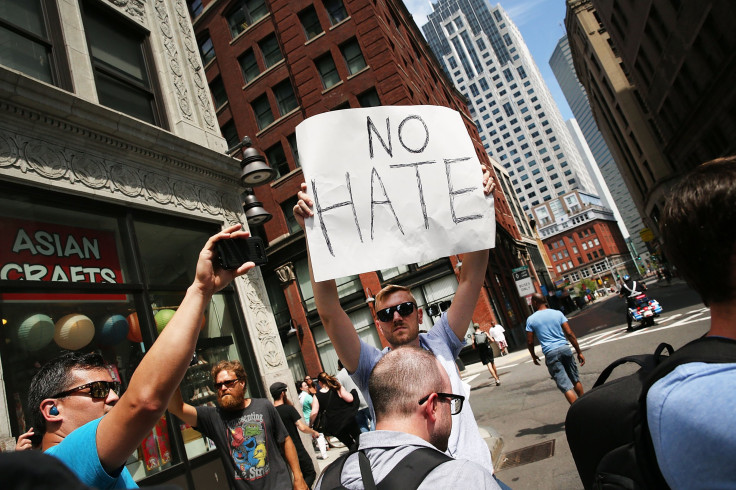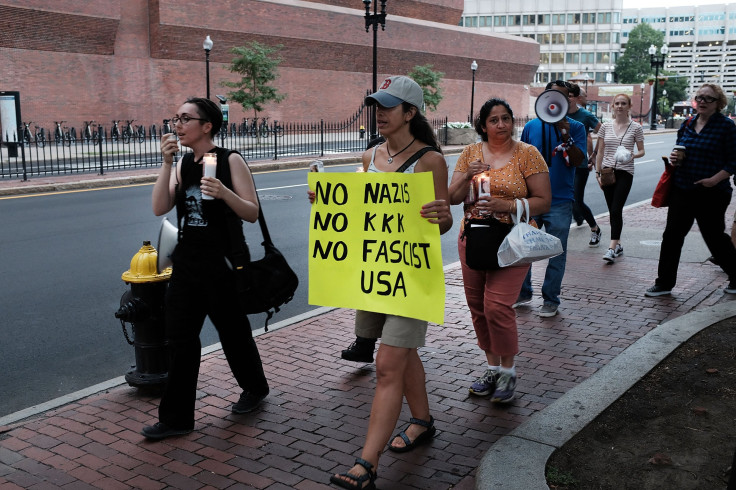Exposure To Hate Speech Could Make You More Prejudiced, Study Finds

Hate speech has, unfortunately enough, become embedded in American social life — both online and offline. In this context, a new study which shows hate speech that targets particular minority groups raises people’s prejudices becomes significant.
The study, conducted in Poland, was led by Wiktor Soral, a psychologist at the University of Warsaw and was published in the journal “Aggressive Behavior” on Nov. 2, 2017.
"When being frequently exposed to hateful online commentaries, people become increasingly desensitized to them," he wrote in the study. "Ultimately, the contents of these commentaries come to shape their perceptions of minorities, immigrant groups, and political adversaries."
According to the researchers, “after passing a certain tipping point” messages that peddle hate cease to provoke any strong emotional response.
As a result, this kind of content comes to be seen as "less negative and harmful, less important, and less violating of social norms." This in turn leads to lowered sympathy towards the victims and also raises prejudice against them.

The researchers found this malicious social effect after conducting two surveys and a laboratory study.
In the first survey, 1,007 Polish adults shared information about how frequently they encountered hate speech that was aimed at gays, lesbians and Muslims. After that, they were read six derogatory statements aimed at the different marginalized groups. On a scale of one to seven, they indicated how offensive they found each statement.
The statements included "Muslims are stinky cowards who can only murder women, children, and innocent people" and "I am disgusted by fags."
Following this, in order to measure the prejudice levels of the participants, they were asked to complete what’s called a “social distance scale.” In this, the participants noted to what extent they would accept people from the minority groups mentioned earlier “as a co-worker, as a neighbor, or part of their family.”
Finally, to measure participants' level of prejudice, they completed a classic "social distance scale," in which they expressed the extent to which they would accept members of those minority groups "as a co-worker, as a neighbor, or part of their family."
According to the researchers, "People who frequently encounter examples of hate speech are less inclined to perceive hate speech as an offensive and abusive phenomenon. … This desensitization to the harmfulness of hate speech was in turn a risk factor of greater prejudice.”
The second survey, that had 683 Poles between the ages of 16 and 18 as participants, was similar to the first — only in this case the minority group was refugees.
It was found those exposed to more hateful speech against refugees were more prejudiced against the group. Also, such people showed greater support for radical, anti-immigrant government policies.
The laboratory study involved 75 Polish university undergraduates.
They were given the task "to read through five web pages from discussion forums and to assess the aesthetics and readability of the page design."
For half the participants, one of the five comments on each page featured hate speech aimed at a specific minority population.
It was found those who read the offensive statements "perceived examples of hate speech as being significantly less offensive" compared to the others. Also, they "exhibited significantly higher levels of prejudice" as compared with those who weren’t exposed to the derogatory comments.
© Copyright IBTimes 2025. All rights reserved.





















